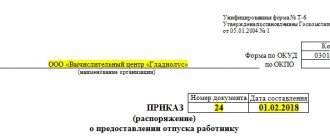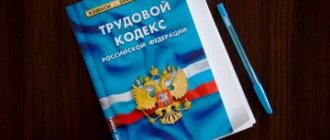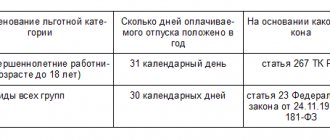Is vacation granted in working days or calendar days?
Not all employees are aware of the specifics of providing annual leave.
The question often arises whether vacation is calculated in calendar or working days. To clarify and clarify this point, you need to resort to the provisions of the Labor Code of Russia, in particular to Article No. 120. According to the Labor Code, annual paid leave is calculated in calendar days . This means that the number of weekends and holidays does not affect the length of vacation.
You can extend your vacation only if you issue a sick leave certificate. Then an application is submitted to the manager to transfer the days deserved for rest, but spent on treatment.
Vacation for a fixed-term employment contract
The right to provide annual paid leave under a fixed-term employment contract is classified as one of the main constitutional guarantees (clause 5 of Article 37 of the Constitution of the Russian Federation). Regardless of whether the employee has an open-ended or fixed-term contract, the employer is obliged to provide such leave. Also, the obligation of the employer to provide leave to his employee does not depend on the general fund of the business entity.
Provisions of Art. 292 of the Labor Code establishes the right to provide employees under fixed-term employment contracts that last less than 2 months with paid leave, which is calculated based on 2 working days for 1 month of work. The same methods for calculating vacation are used for employees who have entered into a fixed-term contract for seasonal work (Article 295 of the Labor Code of the Russian Federation).
How many vacation days are required by law?
Every employee should know how many days they can take vacation according to the Russian Labor Code. This will help him, if necessary, defend his rights.
The standard duration of the annual basic paid leave is, according to Article No. 115 of the Labor Code of Russia, 28 calendar days.
Some categories of employees are entitled to extended rest. Its duration may vary. The management of an enterprise, by collective agreement or local regulation, is allowed to establish a different duration of rest for its employees.
The number of vacation days cannot be less than provided for in Russian legislation.
Minimum number of days
Employees are provided with at least 28 calendar days of rest per year. It is not necessary to take all the required vacation at one time. You can divide it into parts as you wish. At a minimum, an employee has the right to take one vacation day. Situations often occur at enterprises when an employee uses a day of legal rest several times during the working year, and takes the rest in full. This is not a violation of the law.
Maximum number of days
Russian legislation does not have the concept of a maximum vacation duration. This means that the employer can establish extended rest for certain categories of employees of such duration as it deems necessary. Some groups of workers are entitled by law to 56 days of leave.
This includes specialists in the educational field, people whose work is related to chemical weapons. This point is regulated by Article No. 334 of the Labor Code of Russia, Decree of the Government of Russia No. 466, Article No. 5 of Federal Law No. 136, adopted on November 7, 2000. Doctors of Science are entitled to 48 days of annual leave, and Candidates of Science – 36.
The following categories of employees also have the right to extended rest:
- working disabled people of any group . They are entitled to 30 calendar days. This point is enshrined in Article No. 23 of Federal Law No. 184, adopted on November 24, 1995;
- minors . They rest for 31 days a year. This is stated in Article No. 267 of the Labor Code of Russia;
- workers of health care organizations who diagnose and treat HIV-infected people . Russian Government Decree No. 391 of April 3, 1996 states that such employees can rest 36 days a year;
- civil servants . According to Article No. 46 of Federal Law No. 79, adopted on July 27, 2004, they are given 30 compulsory vacation days per year;
- prosecutors and teaching staff of the prosecutor's office . Such employees are given vacation for 30-45 days. This is stated in Article No. 41.4 of Law No. 2202-1 of January 17, 1992;
- workers of emergency rescue services, formations . They are entitled to 30 to 40 days of rest per year. This is confirmed by Article No. 28 of Federal Law No. 151 of August 22, 1995;
- judges . This category of workers is allocated 30-51 vacation days. This point is reflected in the second paragraph of Article No. 19 of Federal Law No. 3132-1 of June 26, 1992, as well as in the fifth paragraph of Decree of the President of Russia No. 941 of September 14, 1995;
- customs authorities specialists . They are allocated 30 calendar days for rest. This point is enshrined in Article No. 36 of Federal Law No. 114 of July 21, 1997;
- employees of the Investigative Committee . Such employees are entitled to 30 days off per year. This point is spelled out in Article No. 25 of Federal Law No. 403, adopted on December 28, 2010.
Rest can be basic (mandatory annual) or additional. All employees without exception have the right to take basic leave. Additional, given to certain categories of workers.
For example, this group includes veterans, WWII participants, coaches and athletes, disabled people, people who work in harmful and dangerous conditions, or have a special nature of work.
Additional days of rest are also provided to employees with irregular working hours, as well as to those employed in the Far North and equivalent areas. They are given about 3-30 extra days off.
The maximum duration is determined individually with the employer. An employee who has benefits can take up to 56 days of basic leave, about 30-50 days of additional leave.
Lack of rest is a violation of the law
The employer is required to provide annual leave to each employee. If he has not done this for two years in a row (regardless of the desire of the employee himself), then he will be brought to administrative responsibility under Article 5.27 of the Code of Administrative Offenses of the Russian Federation. The fine in this case ranges from 30,000 to 50,000 rubles.
Legal documents
- Article 115 of the Labor Code of the Russian Federation
- Article 120 of the Labor Code of the Russian Federation
- Article 112 of the Labor Code of the Russian Federation
- Article 270 of the Tax Code of the Russian Federation
- Article 334 of the Labor Code of the Russian Federation
- Federal Law of December 29, 2012 No. 273-FZ
- Decree of the Government of the Russian Federation dated August 12, 1994 No. 949
- Federal Law of August 22, 1995 No. 151-FZ
- Decree of the Government of the Russian Federation dated August 12, 1994 No. 949
- Decree of the Government of the Russian Federation dated April 3, 1996 No. 391
- Federal Law of July 27, 2004 No. 79-FZ
- Article 321 of the Labor Code of the Russian Federation
- Article 116 of the Labor Code of the Russian Federation
- Article 127 of the Labor Code of the Russian Federation
- Article 5.27 of the Code of Administrative Offenses of the Russian Federation
How long does an employee's sabbatical last?
Sabbatical leave is granted to employees involved in science. This category includes persons who write a dissertation, scientific work, or textbook. A sabbatical is not a time for relaxation in the traditional sense.
This is an opportunity for an employee to work in a different direction. People who have worked in the teaching field for at least ten years are eligible for sabbatical leave.
These are educators, teachers, industrial training masters, speech therapists, associate professors, deans of faculties, heads of departments, methodologists, social educators, etc. The full list of persons is listed in Decree of the Government of Russia No. 678 of August 8, 2013.
The duration of a sabbatical may vary. For example, graduate students who are receiving education are entitled to 3 months of rest. A leave of absence of six months is given to write a doctoral dissertation.
The maximum duration of creative rest according to the Labor Code of Russia can reach 1 year. For this period, the employer is obliged to retain the employee’s position, place of work, and the amount of academic workload after returning from vacation.
Company management does not have the right to fire a person on sabbatical leave. The exception is situations of liquidation of an organization.
Sabbatical leave is unpaid. But the employer, in local regulations or a collective agreement, may provide for the maintenance of wages for the employee.
Dear readers! To solve your problem right now, get a free consultation
— contact the duty lawyer in the online chat on the right or call: +7 Moscow and region.
+7 St. Petersburg and region. 8 Other regions of the Russian Federation You will not need to waste your time and nerves
- an experienced lawyer will take care of all your problems!
Vacation without pay (at your own expense)
When an employee is granted leave without pay (Article 128 of the Labor Code of Russia), its duration is determined by agreement of the parties to the employment contract. That is, the duration of the leave is determined by the circumstances in accordance with which the need to provide such leave arose. In accordance with the provisions of Art. 128 of the Labor Code, this type of leave can be divided into two groups: the first group includes leaves that are provided in accordance with the employer’s decision to provide such leave, the second group of leave provides for the employer’s obligation to provide it at the request of the employee.
Legislative provisions define the reasons, circumstances and legal possibility of providing these groups of vacations. Labor legislation stipulates that the provision of leave without pay must be formalized by an order or instruction on leave for the enterprise. The right to interrupt vacation rests with the employee, with mandatory notification of this to the employer.
How to calculate the vacation period if the employee has not worked for a year?
Vacation is due to a person who has worked 11 months of the working year. But, by agreement of the management, vacation days can be provided after six months of work. This will be a completely official holiday. Minors have the right to take a vacation after working for less than 6 months.
The management of the enterprise needs to calculate vacation pay a few days before the employee leaves for legal rest.
To determine the amount due to an employee, you need to know how long he actually worked at the enterprise. To calculate vacation pay, you must have the following data:
- average daily earnings (this includes wages, bonuses, and rank allowances);
- reporting period (dates of the first and last working day in the calendar year);
- duration of vacation.
Days spent on sick leave or training are not taken into account when calculating vacation pay. Only periods of full-time earnings are taken into account.
Algorithm for calculating vacation pay:
- all income for the reporting period is summed up;
- the resulting figure is divided by the number of days of the reporting period;
- the result is multiplied by the number of vacation days.
Article 123. Sequence of granting annual paid leave
The order of provision of paid vacations is determined annually in accordance with the vacation schedule approved by the employer, taking into account the opinion of the elected body of the primary trade union organization no later than two weeks before the start of the calendar year in the manner established by Article 372 of this Code for the adoption of local regulations.
The vacation schedule is mandatory for both the employer and the employee.
The employee must be notified of the start time of the vacation by signature no later than two weeks before it begins.
Certain categories of employees, in cases provided for by this Code and other federal laws, are granted annual paid leave at their request at a time convenient for them. At the request of the husband, he is granted annual leave while his wife is on maternity leave, regardless of the time of his continuous work with this employer.
Duration of rest for part-time workers
Part-time workers are workers who, in addition to their main place of work, have an additional place of work. They can be internal and external.
The former work in two positions at one enterprise, while the latter are employed in different companies. A part-time worker is entitled to leave on a general basis. The duration of rest is the same as for a full-time employee.
This means that a part-time worker can count on a minimum of 28 calendar days of vacation per year. According to the Labor Code of Russia, annual paid leave at the main place of work and part-time work is provided simultaneously.
In practice it looks like this. At the main place of work, a person is given leave according to the approved schedule. In a part-time job, the employee must be given vacation days during the same period based on the application.
Expert opinion
Irina Vasilyeva
Civil law expert
In case of internal part-time work, annual leave is provided simultaneously for two positions.
Cash compensation for unused vacation
If an employee is dismissed, he must be paid monetary compensation for unused vacation (Article 127 of the Labor Code). That is, the provisions of this article establish the right to mandatory compensation in monetary terms for all vacations that were not used by the employee at the time of dismissal. Moreover, such compensation is paid regardless of the total duration of the vacation and the grounds on which the employment contract is terminated.
The amount for unused vacation is calculated according to the rules that apply to calculating earnings for vacation (Article 139 of the Labor Code of Russia). Compensation can be replaced by the provision of leave at the request of an employee who has the right to provide such leave with subsequent dismissal.
The provision regarding the provision of leave followed by dismissal is the right of the employer and not its obligation.
Letter No. 944-6 of the Federal Assembly on Labor and Employment dated June 23, 2006 states that monetary compensation should be paid regardless of whether the employee receives the right to annual paid leave. If the year for which compensation is paid was not fully worked, then compensation is calculated in proportion to the months worked. According to the above-mentioned normative act, if an employee has worked less than a full month, that is, less than 15 days, then vacation pay and, accordingly, compensation for vacation will not be accrued, and if the employee has worked 15 or more days, then such compensation is accrued based on a full working month.
Also, this legal position is confirmed by the provisions of clause 35 of the Rules on regular and additional leaves, approved. People's Commissariat of Labor of the USSR 04/30/1930 N 169 (valid today in the part that does not contradict Russian labor legislation).
Important; persons who are sent by employment services to carry out public works are subject to labor and social insurance legislation, and, accordingly, a fixed-term employment contract is concluded with them (Article 59 of the Labor Code of Russia). Therefore, according to paragraph 4 of Art. 24 of the Law of the Russian Federation of April 19, 1991 N 1032-1 “On Employment of the Population in the Russian Federation” they have the right to receive compensation for unused vacation if they have worked more than 15 days.
Calculation of the end date of the holiday
The date for calculating the end of annual leave is determined based on the duration of rest. If a person takes 28 vacation days, then he must take them off completely.
For example, if a 28-day vacation begins on 10/07/2019, then a citizen must go to work on 11/04/2019. If the end date of the rest period falls on a weekend, this means that the employee will need to start work on the next working day.
Article 124. Extension or postponement of annual paid leave
Annual paid leave must be extended or postponed to another period determined by the employer taking into account the wishes of the employee in the following cases:
temporary disability of the employee;
the employee performs state duties during his annual paid leave, if the labor legislation provides for exemption from work for this purpose;
in other cases provided for by labor legislation and local regulations.
If the employee was not paid in a timely manner for the period of annual paid leave or the employee was warned about the start time of this leave later than two weeks before its start, then the employer, upon the written application of the employee, is obliged to postpone the annual paid leave to another date agreed with the employee.
In exceptional cases, when the provision of leave to an employee in the current working year may adversely affect the normal course of work of an organization or individual entrepreneur, it is allowed, with the consent of the employee, to transfer the leave to the next working year. In this case, the leave must be used no later than 12 months after the end of the working year for which it is granted.
It is prohibited to fail to provide annual paid leave for two years in a row, as well as to not provide annual paid leave to employees under the age of eighteen and employees engaged in work with harmful and (or) dangerous working conditions.
Can be divided into parts
The law does not require the employer and employee to use the entire period of paid rest at once. It can be divided into parts. But only in such a way that at least one part has at least 14 days. Obviously, the standard 28 working days are conveniently divided into two equal parts in this way. As a rule, this is suitable for both employees and employers. But if a person needs to use all the rest time allotted to him at once, the employer is obliged to provide it in full and has no right to demand the division of vacation time. Also, an employee does not always want to divide his vacation into two halves of 14 days. Sometimes one half lasts two weeks, and the remaining days are scattered in a convenient order for a person, at least one day at a time. This is not prohibited by law.
Dividing vacation into parts
An employee does not have to use all 4 weeks of his/her allotted vacation at one time. Leave can be divided by agreement between the employee and the employer. The division of vacation into parts according to the Labor Code of the Russian Federation must be carried out in such a way that the duration of at least one of the parts is at least 14 calendar days (Article 125 of the Labor Code of the Russian Federation). If this condition is met, the duration of other parts of the vacation can be an arbitrarily small number of days, including 1 or 2 days.
"Northern" holidays
How many days of vacation are due per year of work for persons working in the northern regions is stated in Art. 321 Labor Code of the Russian Federation. “Northerners” are entitled to basic holidays of normal duration and additional ones taking into account the specifics of the work, but beyond this time they are provided with annual paid additional leave as compensation - 16 days for territories equated to the Far North, and 24 days when working in the Far North.
If a northern subject of the Russian Federation is not classified as a group of regions of the Far North and is not equated to them, but wages in it are made using a regional coefficient designed to compensate for unfavorable climatic working conditions, employed persons are entitled to additional leave of absence lasting 8 days (Article of the Law of February 19, 1993 No. 4520-1).
Additional holidays
Labor legislation distinguishes between basic and additional leaves. An additional category of vacations can be introduced by employers on their own initiative, reflecting the standards of work and rest in the collective agreement. But the law has a number of reasons for providing an additional paid period of rest without fail:
- for an irregular work schedule, an additional minimum of 3 days of rest is required (or more at the discretion of the employer), this rule must be stated in the collective agreement or other internal document (Article 119 of the Labor Code of the Russian Federation);
- an additional 7 days of rest are given to specialists whose jobs, based on the results of a special assessment, are classified as hazardous conditions of the 2nd, 3rd or 4th degree, or hazardous working conditions (Article 117 of the Labor Code of the Russian Federation);
- given the special nature of the work performed, the grounds and duration of such rest are regulated by separate legal acts issued by the Government of the Russian Federation (Article 118 of the Labor Code of the Russian Federation).
If an employer, on its own initiative, introduces a system of paid additional vacations, it must calculate vacation pay according to the usual rules, withhold personal income tax from such income, and also charge insurance premiums on it. At the same time, the costs of paying average earnings for additional days of rest cannot be included by the employer in the tax base for income tax.
Read also: Example of a vacation application










